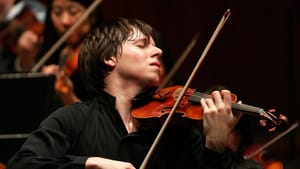Stay in the Loop
BSR publishes on a weekly schedule, with an email newsletter every Wednesday and Thursday morning. There’s no paywall, and subscribing is always free.
Romantic favorites with a top violinist
The Philadelphia Orchestra presents Joshua Bell Returns

Christoph Eschenbach returned to conduct the Philadelphia Orchestra last weekend in a program of Romantic favorites, including selections performed by that most romantic of all violinists, Joshua Bell. He draws crowds wherever he performs, including Friday’s Verizon Hall matinee, and he’s no shallow celebrity but one of our country’s finest instrumentalists—as he proved again in the first half of this program.
The audience enjoyed two performances (and an encore) by the featured soloist: the Poème, Op. 25, composed in 1896 by Ernest Chausson, a lightweight but charming reverie for violin and orchestra; and the main venue for the guest artist, the Vieuxtemps Violin Concerto No. 5 in A minor, Op. 37, composed in 1861. The grand sound of the full orchestra in the Poème at times threatened to overshadow the violin, but by the end of the selection, the two forces were balanced in sonority and volume.
A comeback for Vieuxtemps
The Vieuxtemps concerto was a model of equipoise. Vieuxtemps was a 19th-century Belgian violinist and composer of seven violin concertos. While his works fell out of favor in the 20th century, they are making a comeback in our own time.
Performed in three movements without a break, the score is full of interest and variety, a vehicle for Bell to display a phenomenal technique that never estranged him from his musical conversation with the orchestra.
Vieuxtemps’s No. 5 is a goldmine of musical ideas from 19th-century Europe. In addition to the bevy of virtuosic devices, Bell used his own body and facial expressions to emphasize musical moments and perhaps energize his playing, the way one would wind up a top to set it spinning over a finish line. He controlled the bow with effortless ease, and how I loved to watch it glide over the strings, producing a single dancing line of melody. And those high notes at the end of a phrase, which you secretly pray will come out perfectly on this fretless instrument: each was in fact perfect, something flawless in this very flawed world.
Attired in casual black, Bell still retains an almost shy “aw, shucks” demeanor when accepting applause and a slightly embarrassed smile. He performed an encore with the orchestra’s principal harpist, Elizabeth Hainen, of Chopin’s Nocturne in C-sharp minor, which may very well have been the most sublime moment in the concert.
A bold outing with Brahms
Following intermission, Eschenbach led the orchestra in Brahms’s Symphony No. 1 in C minor, Op. 68. While this symphony is probably one of my least favorites, there is still much to note and appreciate about the work and especially this strong performance. Eschenbach’s clear delineation of the score led me to hear hidden pockets of discord that I had not noticed in other performances, giving a touch of edginess to a composition known for its admirable stability.
Eschenbach conducted with gusto, a consistently commanding volume, and a spirit of determination. The work started boldly with a flourish of timpani mallets and maintained a robust decibel level and forthrightness all the way to the end. There were many brilliant though brief solo passages to showcase the orchestra, notably the percussion (Don S. Liuzzi on timpani), woodwinds, and especially the French horns (Jennifer Montone, principal). Even though it was Brahms, I was glad I came back for the second half of the concert.
What, When, Where
Joshua Bell Returns. Ernest Chausson, Poéme, Op. 25; Henri Vieuxtemps, Concerto No. 5 for Violin and Orchestra in A minor, Op. 37; Johannes Brahms, Symphony No. 1 in C minor, Op. 68. Conducted by Christoph Eschenbach. Joshua Bell, violin. Philadelphia Orchestra. February 15, 16, and 17, 2024, at the Kimmel Cultural Campus’s Verizon Hall, 300 S Broad Street, Philadelphia. (215) 893-1999 or philorch.org.
Accessibility
Kimmel Cultural Campus venues are ADA-compliant. Patrons can purchase wheelchair seating or loose chairs online by calling patron services at (215) 893-1999 or emailing [email protected]. With advance notice, patron services can provide options for personal care attendants, American Sign Language, Braille tickets and programs, audio descriptions, and other services.
Masks are not required.
Sign up for our newsletter
All of the week's new articles, all in one place. Sign up for the free weekly BSR newsletters, and don't miss a conversation.

 Linda Holt
Linda Holt